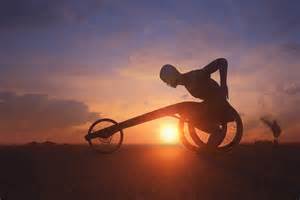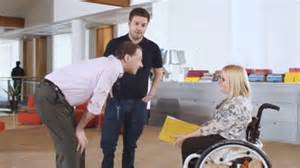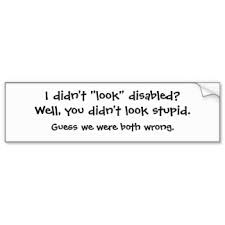I’m sure many mothers out there have read the story below. This is one person’s way of explaining having a disabled child.
Welcome to Holland
I am often asked to describe the experience of raising a child with a disability – to try to help people who have not shared that unique experience to understand it, to imagine how it would feel. It’s like this……
When you’re going to have a baby, it’s like planning a fabulous vacation trip – to Italy. You buy a bunch of guide books and make your wonderful plans. The Coliseum. The Michelangelo David. The gondolas in Venice. You may learn some handy phrases in Italian. It’s all very exciting. After months of eager anticipation, the day finally arrives. You pack your bags and off you go. Several hours later, the plane lands. The stewardess comes in and says, “Welcome to Holland.” “Holland?!?” you say. “What do you mean Holland?? I signed up for Italy! I’m supposed to be in Italy. All my life I’ve dreamed of going to Italy.” But there’s been a change in the flight plan. They’ve landed in Holland and there you must stay. The important thing is that they haven’t taken you to a horrible, disgusting, filthy place, full of pestilence, famine and disease. It’s just a different place. So you must go out and buy new guide books. And you must learn a whole new language. And you will meet a whole new group of people you would never have met. It’s just a different place. It’s slower-paced than Italy, less flashy than Italy. But after you’ve been there for a while and you catch your breath, you look around…. and you begin to notice that Holland has windmills….and Holland has tulips. Holland even has Rembrandts. But everyone you know is busy coming and going from Italy… and they’re all bragging about what a wonderful time they had there. And for the rest of your life, you will say “Yes, that’s where I was supposed to go. That’s what I had planned.” And the pain of that will never, ever, ever, ever go away… because the loss of that dream is a very very significant loss. But… if you spend your life mourning the fact that you didn’t get to Italy, you may never be free to enjoy the very special, the very lovely things … about Holland.
Emily Perl Kingsley 1987
Many people can identify with this. There’s not many people who can say their lives have turned out how they imagined. I am lucky to have my daughter. She is a surviving twin, who was born almost 11 weeks prematurely. She has cerebral palsy as a result. But I wouldn’t say she’s my ‘Holland’. Far from it. She and her younger brother are the greatest adventure I’ve ever been on. There have been times where I have felt physical pain that she will not be able to run around with her peers, with her brother, feel the wind in her hair whilst skipping along and playing like all the other children in the playground. She’s never been one for dwelling on what she can’t do. Now, she’s playing wheelchair basketball with the team, and I know she’s feeling the wind in her hair as she whizzes around the court. She’s doing something she knows her peers can’t do, and she’s getting better every time she plays.
Disability is a personal thing, and everyone has their own disability, and their own way of dealing with that. ‘But wait,’ I hear you say, ‘I’m not disabled…’ I would counter that argument. You may not have a medical condition, you may not have a damaged body, but I assert that everyone has something that disables them. Maybe you can’t drive, you have no sense of rhythm, or you’re afraid of the spider in the bath. These things are your disability. They mean there are things you can’t do. You can’t drive, so you’ll never have a career as a taxi driver. You have no rhythm so you’ll never star on Strictly Come Dancing. You have a spider in the bath…… you get the idea. There are some schools of thought that insist that conditions such as deafness should not be considered a disability. Many parents of deaf children are convinced by the medical profession to have them undergo surgery for cochlea implants. I know deaf people who would say this is unnecessary and I also know people who have lived with these implants for their childhood only to dispense with using them as they get older, and are accepted into the deaf community. The deaf community is strong, so this is possible, particularly in more populated areas of the country. That’s not to say this is the case for everyone. Dame Evelyn Glennie is the first person in musical history to successfully create and sustain a full-time career as a solo percussionist. She became profoundly deaf at age 12, and believes that deafness is misunderstood by the rest of the population.
Many people insist that what you’ve never had, you can’t miss. Not always the case, I think. Absolutely everyone has the ability to be envious of something someone else has, or is doing. And what about the things you did have, and now don’t… are you allowed to miss those? Anyone with a degenerative disease can surely be allowed to be a little melancholy about the progression of their condition. Billy Connelly has sent out a press release today to tell the world that he’s undergone surgery for the early stages of prostate cancer. He chose to tag onto that information the admission that he is suffering from Parkinson’s disease. I’m sure, all over the world there are people who live day-to-day with this disease that are wondering how he is coping. He will have the very best five-star treatment, but despite this, he’s only human. He’ll feel the effects of co-ordination problems, just the same as every other sufferer. Dealing with these conditions within your own head is thought to be a very big issue for anyone recently diagnosed. Counselling is often offered to people following diagnosis. Everyone has their own way of dealing with it. I can’t speak from personal experience, but ive heard that once you make peace in your own head with life changing events, such as dealing with not having control of your own body the way you used to, then you can find yourself again.
Inspirational stories which make the news, such as Angelina Jolie’s recent breast cancer preventative surgery, Jean Dominique Bauby’s story of living with locked in syndrome (The diving bell and the butterfly), Christopher Reeve’s (Superman) story of campaigning for pioneering treatment for spinal patients, make the news because of celebrity status. The emotions these people go through are exactly the same as for ‘ordinary people’.
It’s not just parents of disabled children who have ‘what could have been’ moments. These happen to everyone. These are what makes us human, and what allows us to deal with whatever is thrown at us.
And for every single person reading this… you will have challenges in your life, you will be knocked down and get back up, you may not land in Italy or Holland, but wherever you end up, you are YOU! You are brilliant, and if you choose not to place ‘dis; in your ability, not to live your life with a label, who knows what you can achieve???








